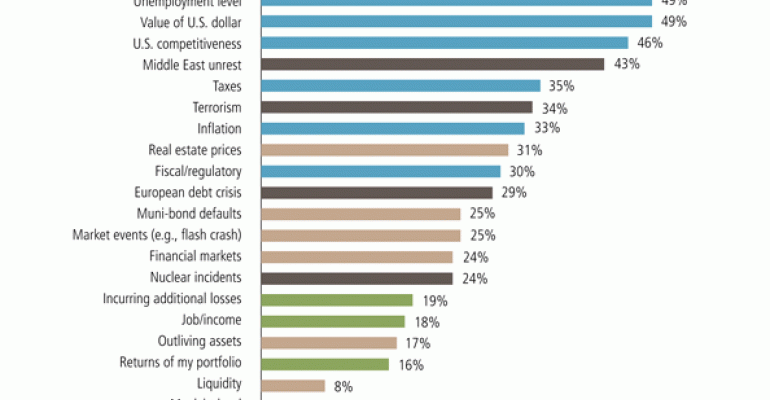The economic threat from unsustainable U.S. national debt—over $14 trillion and counting—is the No.1 concern today for many of the nation's wealthiest families and individuals, according to a new report slated to be released later today by UBS Wealth Management Americas. That represents a sharp reversal from a year ago when wealthy investors said they were mostly concerned with their own individual financial situations, including portfolio returns.
Other top concerns included unemployment, the value of the U.S. dollar and U.S. competitiveness. With the stock market rising and the tumult of the 08-09 credit crisis subsiding, investors’ attention has turned to the great macroeconomic issues of the day. Investors remain cautious, preferring to hold liquid assets, but most respondents reported that they are happy with their current levels of liquid holdings.
A copy of the survey, “Rising optimism among investors tempered by greater concern about long-term strength of U.S. economy,” was obtained by Registered Rep. ahead of its planned publication later today.
The good news for financial advisors: Investors want your help. “More and more they're seeking the guidance of their financial advisors to lead them as they look to re-enter the markets,” says the summary findings of the UBS Investor Pulse Survey. “Indeed, the single most significant signal to re-enter the markets is their Advisor's recommendation about when to reinvest.”
“Actually, we were surprised by the finding on the national debt,” said Paula Polito, chief marketing officer at UBS Wealth Management Americas, in interview with Registered Rep. “If you had asked the same set of questions a year, two, or two and a half years ago, investors would have puts concerns like taxes, the financial markets, real estate at the top of the poll.”
Here's what the poll is telling FAs, said Polito: Have your “conversations” with your clients around the pressing economic issues. So pressing that 59 percent of investors said they were worried or extremely worried about the U.S. debt level; 49 percent about unemployment; 49 percent about the value of the U.S. dollar and 46 percent about U.S. competitiveness. By contrast, only six percent were worried or extremely worried by their personal debt; eight percent cited liquidity; 16 percent cited returns on their portfolio and 17 percent referenced outliving their assets.

“In fact, this survey also underscores the ever-important priority for our financial advisors,” according to the survey, “to continue the conversation with their clients about how to confidently make decisions and move forward with optimism during times of great change. Finding solutions for revitalizing America will provide us with another important opportunity to address our clients' long-term concerns.”
Polito agreed that the findings would help inform the kinds of investments suitable for clients, which could potentially include investments in emerging markets and multi-currency strategies. “When you make choices today, you have to think differently than you have thought five or ten years ago,” she said.
In other findings, 44 percent of investors today feel excellent/very good about their financial situation compared with 36 percent in August; 52 percent are somewhat/very optimistic about the overall short-term outlook on the U.S. economy compared with 36 percent in August. In the wake of the death of Osama bid Laden, investors were ask if they believe the threat of terrorism was now higher, lower, or about even. In the short-term, 60 percent of investors thought the threat of terrorism was higher; long-term that dropped to 22 percent, according to the survey. Forty-three percent said the death of bid Laden strengthened U.S. standing abroad.
In the summary that accompanies the survey, UBS notes that the investors polled, “recognize that solutions may require sacrifices—in the form of higher taxes and fewer entitlements to reduce the national debt. Their concern centers not just on the immediate negative impact of unsustainable spending, but also on the implications of accumulated deficits on future generations.
Most important, these issues are significantly influencing their investment decisions—if, when and how to invest in the future.
Polito said investors are beginning to finally realize there is a correlation between the macro trends, such as the national debt, and their own portfolios. “I do think the juxtaposition is very interesting,” she said, referring to the findings of the latest UBS poll. “It's almost like a higher order has emerged.”
The survey was conducted online among 2,495 affluent and high-net worth investors during March and April 2011, and updated in early May among 1,236 investors. Forty-six percent of respondents had at least $1 million in investable assets. All were aged 25 or older and had at least $250,000 in investable assets (which excludes real estate and private business assets).





